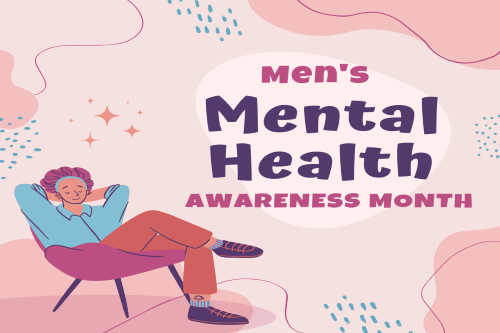
Men’s mental health is important and that all men need support if they are going through distress and suffering.
Published Wednesday, 17th November, 2021 in University news
This month is Men’s Health Awareness Month which marks an important time to talk about the mental health of men and how we can reduce stigma, do away with societal expectations and increase the likelihood of support uptake among men. At City, we are aware that men’s mental health is important and that all men (husbands, brothers, sons, fathers, colleagues, and friends) need support if they are going through distress and suffering.
There continues to be reports of men taking their own lives because of pressure, anxiety and stress and trying to conform to traditional societal expectations and gender roles which require men to be ‘masculine’ and exhibit traits such as dominance, power, and control. Such men are expected to not show emotion or feelings as that is deemed to be manly. More men have continued to suffer mentally because of Covid-19 related job losses and other pressures.
The Mental Health Foundation reports that:
One in eight men has a common mental health problem such as depression, anxiety, panic disorder or obsessive-compulsive disorder (OCD).
Check in on your friends and see how they're doing. If you're not sure how to start the conversation, take a look at tools like Movember's 'Simple steps to imporant conversations' which covers how to prepare yourself (and making sure you yourself are in a good mental state), tools to reach out and practice conversations.
We encourage male students and men in general to seek the support they need to avoid loss of life and other health disorders. The Counselling, Mental Health and Accessibility team at City is committed to the wellbeing of students including men in helping you fulfil your full potential during your time at City.
If you need a safe place to share how you’re feeling and get support through courses & resources, City students have access to Togetherall using your academic email address. You can also join in on the three times a week lunchtime Mindfulness drop-in sessions facilitated by City's Centre for Mindfulness Research (CEMR).
Crisis and emergency services and helplines
If you are concerned about your safety, you should contact the crisis and emergency services.
If you require immediate, urgent medical or psychological help and support you can do any of the following:
- Contact your GP to book an emergency appointment
- Call the Samaritans on 116 123
- If you are currently in student halls you can contact a member of staff for help and support
- Visit your nearest A&E, which you can find here
- If more immediate, urgent care is required you can call an ambulance by dialling 999
- If you are outside of the UK, please contact your local doctor or specialist services.
If you have a mental health condition and are already accessing specialist NHS services, you should receive the guidance on the Crisis and emergency Hub page.
